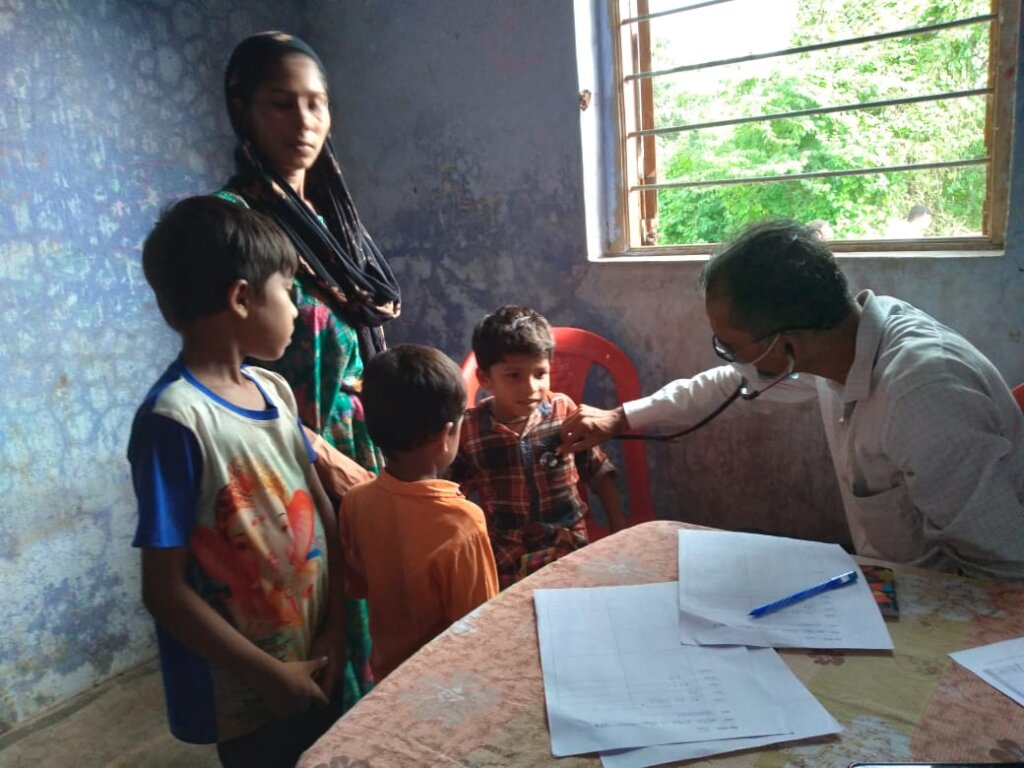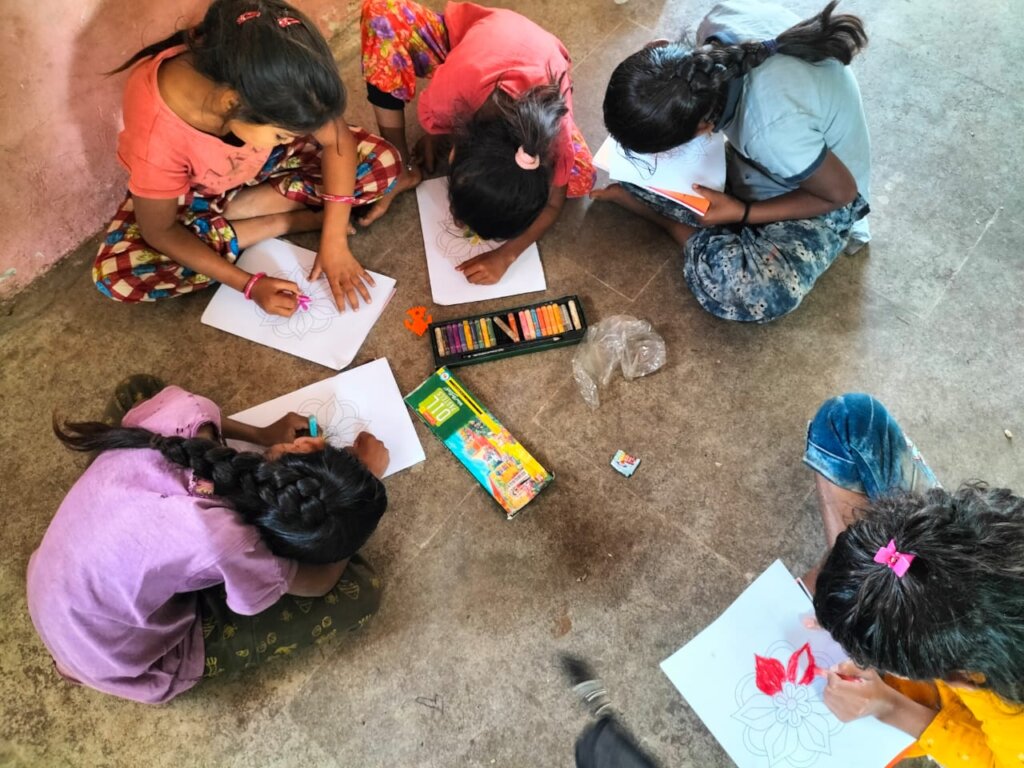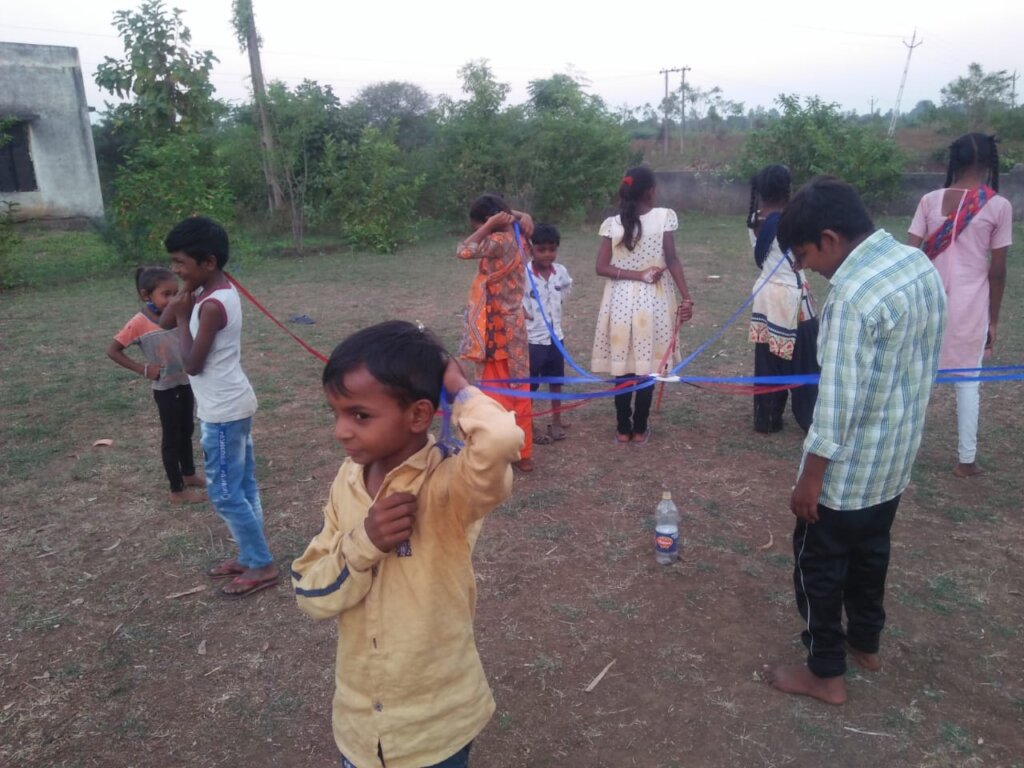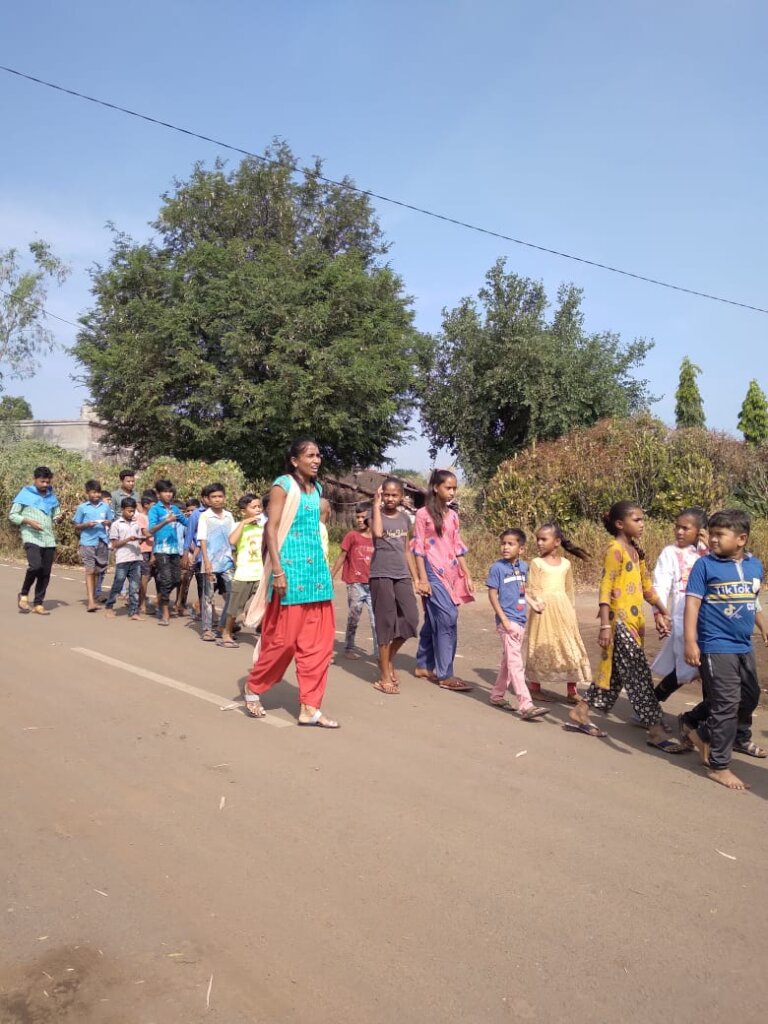By Isha Sheth, Bibha Sinha | Project Coordinator
Note: All the names have been changed while sharing an incident to protect the identity of the child.
Shaishav has been working with children and empowering them through child rights since 1994. Since 2018, Shaishav has launched a new project “Aaranyak” in Dediapada of Naramada district.
About Aaranyak:
Aaranyak is one of our Upnishads: Aaranya means forest and Aarnyak means “the people who live in forest”. We strongly believe that each child is UNIQUE, so their passion, learning styles, pace everything is UNIQUE. However, the opportunity to be unique is not given to children in the mainstream schooling system, especially to tribal children who hardly have access to education, leave aside quality education.
Shaishav intends to initiate an innovative yet sustainable model of education for tribal and other children through a learning and living space at “Aaranyak” in Dediapada block in Gujarat.
Under Aaranyak, three projects are running in Dediapada block which are Vanshala, Child-Friendly Villages and Aashramshala.
VANSHALA
Vanshala has been running in Dediapada, Gujarat for the past 2 years for children aged from 5-14 years in two villages which are Samadpada and Pomlapada. Here, Children learn about life skills and child rights, they get in-depth knowledge from the facilitators.
In these past four months, 241 children have come to the learning points of Samadpada and Pomlapada and Nani Almawadi.
At Vanshala, we do activities on educational context, life skills and child rights for their holistic growth. From educational concepts it helps children to build a strong knowledge in their academics which is lacking in formal schooling. Life skills to build confidence in children which is very vital in every aspect of life. Creativity is one such skill which is being more focused in these two villages because this will help children to think out of the box and this will broaden their skills in terms of thinking, problem-solving and many more which in future will help them to live a good life.
At the learning points children enjoy doing activities on life skills but they also learn through tablets which helps them to clarify their academic doubts. Children participate in library days where they are free to learn and read those books which interests them the most and through sports children learn while enjoying the games.
In addition to these, we also believe that teaching about adolescence is as important as other skills are for older kids aged from 10-14 years because it’s children's right to be educated about the changes in their bodies.
ACTIVITIES WITH CHILDREN AT POINTS
On a daily routine, the team does activities with children on life skills such as communication, creativity, decision making, teamwork, leadership, etc. Children are also learning about nature and the environment. These activities help children to enhance their cognitive, intra and inter personal skills. Through these children have built confidence in themselves.
Creativity Days:
Skill of creativity is very essential in self-designed learning. Children are inherently creative, however due to various conditioning this skill diminishes. To enhance the creativity of children we are organizing creativity days once in fifteen days.
Library days:
To increase the vocabulary in children, increase in thought process and speak clearly, we keep Library Day every fifteen days. We take age-appropriate books for children and they sit in the groups to read them. The facilitators also read the books to the younger children if needed. Children share and learn through books.
Sports days:
Sports activities teach children to be disciplined, respect others, and help to work in a team. This educates children on how to be a good sport person in their real life and how to cope up with winning or losing which every child should learn.
Some of the games and physical activities are: Exercise, cricket, kho-kho, kabaddi, tom & jerry, bhul-bhulavani, passing the ball, four squares etc.
Celebration of different days:
Along with the life skills, child rights and educational activities Aaranyak also celebrates the national and international days to educate the children that these days are also very important to keep ourselves aware about the current situation and develop a sense of responsibilities towards the nation/society. We celebrated Nutrition Day, library day, sports day, first-aid day, environment day, Rivers Day, Raksha Bandhan, etc.
We observed Independence Day as well. On Independence Day, we sang the national anthem, and did some games with children that showcased the importance of the independence and values with which the freedom struggle was fought.
Adolescent girls’ and boys’ groups:
When the children hit adolescent age, there are many physical, mental, and emotional changes in their bodies and mind. Through adolescent girls’ and boys’ groups we teach children about them, as well as other things affecting their lives like what is gender? What is a girl? What is a boy? What is healthy friendship? How to stay safe online? Goal setting and how to achieve it, etc. The team of Aaranyak made the agreement with the consent of children that everybody will respect every person’s sharing about their adolescence and not to tease. Both the children and the team agreed that they will create a safe place for everyone.
FEW CASE STUDIES FROM THE GROUND
Case Study: 1
A 12-year young girl named Ritu (name changed) who studies in 8th standard is very active and likes the activities that facilitators come up with. Whenever she feels that she is not getting something then she asks without any hesitation. She has a desire to learn new things simultaneously. She learns and understands the activities very quickly. It didn’t take much time for her to understand. Again she is expressive too, she does share her feelings with the facilitators when she feels like it. In group participation with other children Ritu always takes leadership and initiative to do things, her behaviour is also very nice & engaging with other children.
Facilitators have observed a change in her behaviour, skills & interests which has increased, now her thinking skills have been broadened, Ritu finds that she also has an interest in scientific activities, and making diverse things with paper has aroused her to explore new things. At the end of every activity, she shares her observations and learnings with the team. Ritu always shares her experience with her parents and siblings, she tells them about the things she learned and how she felt. She likes coming to the learning point so much that she didn’t want to miss even a single day when her parents didn’t want to send her out and learn. Then she asks for help from facilitators and tells them to convince her parents so that she can come regularly.
Case Study: 2
Diksha (name changed) is a 13 years old girl who is in 8th standard. Her father is a laborer and her mother is a farmer. Diksha has to do maximum home chores which she doesn’t like to do. Even though Diksha has a lot of work at home and school she always manages to come to a learning point. Loaded with a lot of work still, she is very much dedicated and eager to learn new things. She loves to draw, is curious to know about the solar planet, interested in science experiments & human body parts names etc. When the human body was introduced, she was startled to know the names which she didn’t know, it was very much interesting for her.
When she received the activity book and kits from Shaishav she was very happy, she expressed that she liked it so much that after having that she started to learn from that material at home. She teaches her younger brother all those games and activities which she has learned from the learning center.
During covid when schools were closed, facilitators started to do educational activities with children through a tablet. Diksha expressed that it was very much helpful for her because the content was good and with the help of facilitators she can understand through the tablet. These activities have increased her cognitive skills and are very keen to develop her skills.
Case Study: 3
A 13-year-old boy named Ankit (name changed), studies in 8th standard. His father is a farmer and his mother is a house maker and a farmer.
Ankit wants to become a policeman and it’s been 2 years since Ankit came to the learning point. He enjoys learning new things and because of this he eagerly waits for the facilitators to come and interact with him. He believes that his learnings will be very useful for him in the future and now he explored his unnoticed skills which have been hidden for so many years are now being noticed by him which he didn’t know. He explored his critical thinking skills, teamwork, and creativity. He likes to do science experiments and papercraft is of his interest. Through tablets, he learns many things and very quickly. He usually gets stuck while learning from textbooks but through the tablet, it is easier for him to understand. He feels very delighted that facilitators come to his village for him and other children.
CHILD-FRIENDLY VILLAGES
This project is running from July 2021 in 11 villages of Dediapada, Gujarat. This has commenced for children where they can enjoy and utilize their rights in those villages from where they belong. In these villages there will be a children's collective group where they can also participate with elders in decision making and their voices will be heard.
Children who come from these villages are very vulnerable ones who need support to live their life in a good way and it’s their rights that it needs to be fulfilled.
Like the Vanshala project, children of these villages are also introduced to life skills. They are also getting knowledge on nature and environment. In addition to these sports are also one of the major categories of skills which children enjoy and learn simultaneously.
ASHRAMSHALA
Work in Ashram Shalas has started from past 2 years. These are residential schools for tribal children. Due to COVID-19 our work in Ashramshala had stopped, but now with school being reopened, we are starting our work in Ashram Shala again. Till now, Team has reached a total of 288 children where girls are 153 and boys are 135.
The purpose behind the intervention is that those children who reside in Aashramshala didn’t get the opportunities to learn things that other children can learn and benefit from the activities which facilitators conduct in the learning points.
The idea of intervention is because children are marginalized, underprivileged and stay in Aashramshalas only. To give them support, the team interacts with children and educates them on how to protect themselves. For these children, the team has a whole curriculum on Adolescence which facilitators teach them through activities. We cover a wide range of topics related to Adolescence and life skills. The topics related to Adolescents are What is Adolescence? physical, mental, emotional changes during puberty, menstruation, understanding gender, what is a girl? What is a boy? We also teach life skills such as creativity, communication, problem solving and interpersonal relationships. We facilitate these sessions using practical training, use of various Teaching and Learning materials using experiential education methodology.
CHILDREN’S LEARNINGS
Children learned a lot of new things from the activities. From life skills they learn about effective communication, concentration, thinking critically and creatively, they learn on how to make the best out of waste and they get an idea on how to be friendly with others through games, etc.
Through adolescence activities children learned to know the names and changes in their body parts during puberty, from the activity of ‘Agreement between boys & girls, children get to learn that all of them are equal and they are capable of doing equal work. These things are new for children and with these activities, they have been benefited to speak confidently.
ADOLESCENT PROTECTION and EMPOWERMENT TRAINING OF TRAINERS
The Training was conducted in Bhavnagar, Gujarat. The team gets trained on various topics which adolescents need to know and be aware of. Some of the topics were differences between Gender and Sex, Physical, mental, emotional changes during puberty, understanding of male and female body parts, how to stay safe Online, Discrimination related to caste, class, and gender in the society and how to overcome from those, healthy friendships and bullying, healthy body image, etc.
This training was for the facilitators to build in-depth knowledge on Adolescence, things happening in society and how children can protect themselves from any kind of abuse.
CRYPTO KIT DISTRIBUTION:
A covid cum medical kit was donated by the Crypto Relief and we distributed them in 8 villages to 600 children’s families of project Aaranyak at Dediapada. It was distributed to keep children safe during Covid so that children and their families don’t get affected by the virus. Their immune system is able to fight the virus and their learning should continue without any further breaks.
FORMATION of BAL SAMITI:
Bal Samiti, A children’s committees have been formed in 5 villages. It has six components (Art & Culture, Sports, Games and Fun, Education, Health, Protection, and Environment & Cleanliness). Children chose the Samitis they were most interested in and to run these Samitis, one boy and one girl were made leaders of each of these samitis. Children also wrote down their responsibilities as Samiti members and made plans of what they would like to do each month as a Samiti.
Through these children will learn to take leadership, know their and others' responsibilities, learn how to conduct the meetings and will also learn planning and implementing. So, through these processes, they will learn their child rights especially Right to Participation as well as Life Skills. It will make them more empowered by increasing their agency.
MEDICAL CAMPS:
These camps have been done in two huge villages of Dediapada which are Samadpada and Pomlapada. Intention to do these screening camps are to help parents know about the importance of health. These medical camps aimed at encouraging parents to develop a sense of responsibility towards their children’s health. Camp was also focused to help the parents of Samadpada whose children are suffering from serious health issues by referring their cases in good & quality care hospitals and doctors for the treatment.
Doctors and team had come from Vadodara. Two were Paediatric doctors and 4 people had come to volunteer in this camp. Doctors and their team had come with medicines and chocolates to give to the children. The medical camp was for all children up to 18 years.
During the medical camps children were engaged in diverse activities such as Latak Matak, fingerprint painting, dot art, and movies like “Bhaago Bhoot” and “Our planet” to make children comfortable so that they don't get nervous. Team of Aaranyak were also having conversation with Parents who had come with the children.
The camp went successful because children and parents felt that it is very necessary to take care of their health.
In Samadpada, 88 children attended the camp. About 49% of children were clinically found to be Anaemic. Out of these 4 were referred to SD Hospital Dediapada for Sickling Test. 12.5% cases were of Dental caries. One case of Vitiligo, one of Duchenne’s Muscular Dystrophy and one of Obesity, these cases were unusual.
In Pomlapada, 115 children attended the camp and about 33% of children were clinically found to be Anaemic. 24% cases of Dental caries which are found in children and adolescence.
In both these two villages, the ratio of female attendees was more than male, 72.5% in Samadpada and 70% in Pomlapada .
In this process, we also found that schools have stopped giving children Iron Folic Tablets weekly, and Albendazol biyearly to mitigate Anemia due to school closures during the pandemic. In the coming weeks, we will work with the school authorities to give out the tablets once again to the children and also motivate the children to take them as well.
CHILD RIGHTS WEEK:
From 14th- 20th November, a child rights week was celebrated in the 14 villages of Dediapada and 1 village of Netrang Block. We commemorate this week as Child Rights week to increase awareness among children to improve their welfare and promote the rights of children as 14th November is Children’s Day and 20th November is International Child Rights day. This celebration helps the people of villages, especially parents and adults, to know about their responsibilities for making their children's lives comfortable, healthy, and happy. In addition to this, the main focus this year was also on women's rights, gender equality and protection of girls from abuse and discrimination.
During this week the team did rally with children in each village, distributed pamphlets on child rights, child safety, and parents’ responsibility towards their children in around 1100 houses. We also put up an Exhibition on child rights, and street-plays on girls’ and women’s rights were performed by the team in all the intervention villages.
The team reached 361 boys, 340 girls, and around 900 parents during child rights week.
Gandhi Mela:
Gandhi Mela was organised in all 14 villages of Dediapada block for children where they learn about the values of Gandhi ji and life lessons from his tremendous journey of his life.
In this mela, Children played games like Khatro ke khiladi, looto lootai atlu, nav bindu, etc. where they could experience some of the values of Gandhiji and his beliefs and thoughts. The team prepared a role play on different roles Gandhiji played and numerous skills that he had like weaving, tailoring, making shoes, cutting hair, cooking, nursing someone back to health, etc. Few activities were also conducted for children which were making charkha, fill colours on Gandhi Ji’s portrait was for younger kids of class 1st to 4th and demonstration of ratio (charkha), Moniyo ane hun (To reflect values of Gandhiji in one’s own life) and for older kids from standard 5th-8th.
Organizing this mela was an intent to help children of this new generation know about the history of our nation, Gandhi Ji and his values to live a life full of satisfaction.
Case Study
Piyush is a 10-year-old boy from village Sejpur, studies in 6th standard and lives with 4 members of his family. It’s been 2 years since he came to this point. In the beginning, Piyush was a hyper-aggressive child, he used to fight with other children but now things had changed for a few months. The several activities based on building relationships, friendships, teamwork, etc. conducted by the facilitators had a huge impact on Piyush’s behaviour because he has stopped fighting with other children, and now he understood that it is not a good thing for him and others. Piyush has started to help others who are in need, and pays attention during the activities because he enjoys that. He also acquired skills in teamwork and leadership.
Things Piyush has learned is that- living together is good for everyone. He believes that in our world there should not be any gender discrimination ‘Every people must have the equal right’.
Project reports on GlobalGiving are posted directly to globalgiving.org by Project Leaders as they are completed, generally every 3-4 months. To protect the integrity of these documents, GlobalGiving does not alter them; therefore you may find some language or formatting issues.
If you donate to this project or have donated to this project, you can receive an email when this project posts a report. You can also subscribe for reports without donating.
Support this important cause by creating a personalized fundraising page.
Start a Fundraiser


